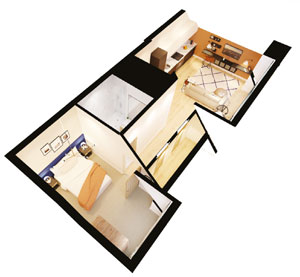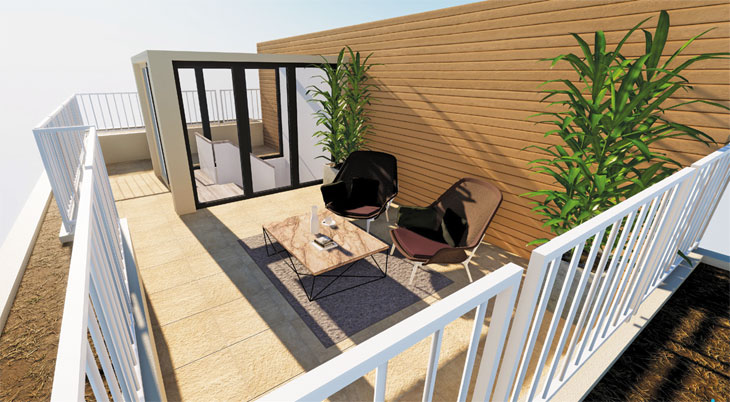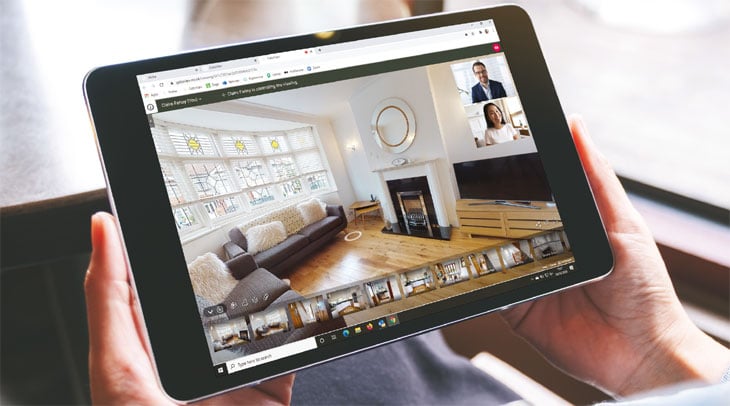
Now imagine yourself as a ‘virtual’ agent – another avatar – showing your clients around that same house, explaining the selling points in more detail. It certainly beats pounding the beat on a rainy Monday afternoon.
CGI technology

The interior of a building can be entirely created using DCTR.
Welcome to the brave new world of property sales, where CGI is the smart new kid on the block. The technology that has revolutionised movie-making is one of several new approaches borne out of the pandemic that are revolutionising the way property is sold. Of course, 99 per cent of buyers will still want to make a physical viewing before making what will be the biggest financial commitment of their lives.
But virtual viewings, whatever form they take, are helping agents sell more homes by eliminating tyre-kickers and providing a supply of potential buyers who have effectively pre-qualified themselves – because they, in turn, have been able to quickly and easily rule out unsuitable properties. One of the leading proponents of CGI is DCTR, formerly Dr Photo.
Like playing a game
 “It’s a bit like playing a game – unlike camera-based tours, this has free movement – you can actually walk around it as if it were a game and interact with it,” says director Tom Durrant.
“It’s a bit like playing a game – unlike camera-based tours, this has free movement – you can actually walk around it as if it were a game and interact with it,” says director Tom Durrant.
A 360-degree tour with a camera might look like the lower deck of Noah’s Ark, but we could completely CGI that to show its potential. Tom Durrant, DCTR.
“For example, you could change the colours of the walls or the work surfaces in the kitchen – so if a developer had different specifications for a property, the user can change all the different materials.” While DCTR’s main business is with off-plan developments, it can also be used with pre-built properties.
“If a property had a lot of potential, if you were to create a 360-degree tour with a camera it might look like the lower deck of Noah’s Ark, but we could completely CGI that to show its potential,” he explains.
“We developed this during the pandemic to solve a need. We felt that the consumer, over the course of this horrible 12 months, got a lot more savvy about virtual tours and there is an expectation of what this kind of marketing is about – it’s raised the bar.”
However, Durrant still feels there is a place for traditional photography. “If you think of the journey, the first thing they are going to see on Rightmove is the photo, and that’s got to capture their eye and their imagination. I think 360-degree tours are really great for the next stage of the journey.”
Transformational change

Another company that’s gone heavily into CGI property tours is Revvis Group.
 “I think ultimately it will be a transformational change,” says director Nigel O’Connell. “The biggest impact in our life is the availability of time. The necessity of viewing a property in person will always remain the same but virtual viewings give buyer the opportunity to make more informed decisions about where they are going to apportion their time.
“I think ultimately it will be a transformational change,” says director Nigel O’Connell. “The biggest impact in our life is the availability of time. The necessity of viewing a property in person will always remain the same but virtual viewings give buyer the opportunity to make more informed decisions about where they are going to apportion their time.
In the new-build sector a lot of vendors are shifting away from a homogenous product where all the properties have one fit-out and are starting to offer more choice. Nigel O’Connell, Director, Revvis.
“Whereas in the old days the agent would say, ‘I’ve five in your budget, let’s go and see them’, people don’t want to do that any more. Virtual viewings are enabling them to assess a property in greater detail, and decide whether they would like to view them or not.”
 O’Connell agrees with Durrant that the pandemic has had a huge impact on the growth of virtual tours. “It was a growing sector before Covid happened but Covid has accelerated it greatly because of necessity – it was the only way people were able to look at properties during the initial lockdown.”
O’Connell agrees with Durrant that the pandemic has had a huge impact on the growth of virtual tours. “It was a growing sector before Covid happened but Covid has accelerated it greatly because of necessity – it was the only way people were able to look at properties during the initial lockdown.”
Revvis uses real-time rendering and claims to have the highest level of customisation in the UK, with users able to redesign a room using simple drag-and-drop techniques.
“What we offer is not only being able to virtually view a property, but also being able to change and reconfigure any element of the property – the flooring, the colour of the walls, refit a new bathroom or kitchen –you can do that while you are undertaking the viewing and see those changes in real time,” he explains.
“What we are finding is that in the newbuild sector a lot of vendors are shifting away from a homogenous product where all the properties have the one fit-out and are starting to offer more choice – whether it be four or five different kitchen choices, bathrooms, whatever it may be, the buyer can be shown as they ware walking down what the different finishes will look like.”
O’Connell also believes there is scope for using CGI to market existing homes, as well as new developments.
“Agents who are dealing with empty property can virtually stage it to showcase what it could look like, or agents trying to sell a property that is slightly quirky can communicate not just how the space is, but how the space could be.”

CGI from Revvis can be used to market existing homes as well as new developments.
Slick virtual tour
For many, however, the 360-degree photographic tour is the biggest winner from Covid restrictions, with Giraffe360 leading the charge. Giraffe’s high-end 3D cameras are supplied as part of the subscription package, and all the agent has to do is take one photo in each room and send the results to Giraffe, which stitches them together into one slick virtual tour that works rather like Google’s Streetview.

 Giraffe’s founder, Mikus Opelts, came up with the concept when looking for offices for his company, which at that time was putting together virtual tours for hotels.
Giraffe’s founder, Mikus Opelts, came up with the concept when looking for offices for his company, which at that time was putting together virtual tours for hotels.
Last year we had clients who sold more property using remote viewing guided VR tours like that than using regular viewings – efficiency went up significantly. Mikus Opelts, Founder, Giraffe360.
It was that all-too-familiar feeling we have all experienced when viewing a property as a potential buyer: you instantly know it’s not right for you, but you have to go through the motions and feign interest anyway. Visiting one potential office, “within the blink of an eye I knew but was not for me but I needed to spend about five minutes browsing around looking in rooms trying to look interested”, Opelts recalls. “I thought, ‘This is broken, there has to be a better way’.”
Remote guided tours
Giraffe is now one of the market leaders, combining the 360-degree camera with laser-activated LiDAR (light detection and ranging) technology that not only creates a virtual tour, but also generates an accurate floorplan.
Again, the restrictions of 2020 saw a boom in business for both Opelts and his customers. Where the virtual tour had been an add-on to the floorplan offering, it became the main attraction – with agents even able to offer remote guided tours to potential buyers using Zoom and Teams.

“That was the killer function that enabled a lot of deals,” adds Opelts. “Last year we had clients who sold more property using remote viewing guided VR tours like that than using regular viewings, and efficiency went up significantly.”
He says Giraffe is all about content and presentation using professional-looking photography. “We’ve been a step ahead in what’s needed because we’ve packaged everything into one technology and one system because we felt that was what would be needed,” he adds.
LiDAR technology

With LiDAR now appearing in Apple’s top of the range iPhone 12 Pro Max and iPad Pro (though not currently any Android phones), it brings the affordability threshold to DIY floorplans much closer for those agents looking to save cash.
 Metropix founder Max Christian has now set up a new business called RoomScan LiDAR. Using its software and an iPhone or iPad, agents can easily generate a floorplan themselves, as he explains. “There has always been a certain pfaff factor in drawing floorplans and what is really important is to apply this new tech to creating accurate floorplans really accurately, really quickly and really cheaply.”
Metropix founder Max Christian has now set up a new business called RoomScan LiDAR. Using its software and an iPhone or iPad, agents can easily generate a floorplan themselves, as he explains. “There has always been a certain pfaff factor in drawing floorplans and what is really important is to apply this new tech to creating accurate floorplans really accurately, really quickly and really cheaply.”
The LiDAR sensors in phones have made it possible to get accurate floorplans in a jiffy. You don’t need handheld lasers any more – you just tap on walls on your screen. Max Christian, Founder, RoomScan LiDAR.
“The LIDAR sensors in phones have made it possible to get accurate floorplans in a jiffy. You don’t need handheld lasers any more. You just tap, tap on the walls on your screen and you’ve got the floorplan, with measurements you can trust.
“You go through room by room and the floorplan is immediately available – it doesn’t need processing by some behind-the-scenes team.” RoomScan doesn’t currently offer 360º tours as part of the package, but it’s on their roadmap.
Floorplans
 Floorplans are still very much the staple of property listings, and long-time player in this field PlanUp has now enhanced its product to include photo plans.
Floorplans are still very much the staple of property listings, and long-time player in this field PlanUp has now enhanced its product to include photo plans.
“Once you have a floorplan we have a link that opens up a web page that shows that floorplan. They can then click and drag a hotspot onto the plan and attach a photo – it only takes five minutes,” says key accounts manager Steven Flatman.
“You’re almost committing commercial suicide by not having a floorplan on your listing – they are super cheap, they don’t take long to create and everyone wants to see a floorplan on a listing.”
Flatman believes that however advanced virtual tours become, floorplans will always have a place. “A 2D plan view of the property when buying or selling is just as important as a blueprint when you are building a house,” he stresses.
He also warns that while he thinks agents are now almost forced to include virtual tours to appeal to vendors, there can be drawbacks of offering them to early in the home-buying journey.
“You may be looking at a property as a potential buyer and you’ve got a virtual tour, and straight away you might realise it’s not for you – whereas a floorplan may not show that particular aspect that makes you initially shy away from the property,” he says.
The year of the pandemic has seen many seismic shifts in the way we do business, with the collapse of high street retailing the most glaring example.
Will these new virtual technologies transform the property industry to the same degree, or are they a passing fad? No-one can be sure, but few seem to think it will be business as usual when the pandemic finally peters out.
Guided tours

Nichecom’s GotoView has allowed buyers to whittle down their shortlist at home
Another company offering guided virtual tours is FocalAgent. Its 360° Matterport-powered viewing platform keeps the agent in the driving seat, enabling them to host a guided tour, answer any questions and switch seamlessly between properties.
 Lee Wainwright, CEO of FocalAgent, says going virtual offers considerable time savings for agents, who are able to filter out all but the most serious parties without leaving their desk.
Lee Wainwright, CEO of FocalAgent, says going virtual offers considerable time savings for agents, who are able to filter out all but the most serious parties without leaving their desk.
Agents were conducting up to eight viewings an hour with the technology and seeing a third drop in the number of viewings undertaken before an offer was received. Lee Wainwright, CEO FocalAgent.
The pandemic offered a unique opportunity to prove to agents how virtual viewings could transform their businesses.
FocalAgent teamed up with Zoopla last autumn to give selected agents free access to its FocalViewing platform.
“The partnership was a tremendous success,” explains Wainwright. “Research showed that Zoopla agents were conducting up to eight viewings an hour with the technology and seeing a one-third drop in the number of viewings undertaken before an offer was received.”
Wainwright says virtual viewings make it easier for a higher number of people to view a property, which in turn increases the likelihood of a sale or let. “This represents a significant step forward for the customer and the agent, making it easier to narrow down a list of properties, reduce time-consuming in-person viewings and focus on what agents do best – selling and letting homes,” he adds.
Video-call technology
NicheCom’s accompanied virtual viewings have also enabled agents to present a property to prospective buyers via an immersive Matterport 3D walkthrough, using video-call technology.
Buyers have been able to home in on all the details, ask all the usual questions and build a rapport with agents without the need for a physical visit.
 Peter Burnham, Managing Director of NicheCom, says regular users of its GotoView platform say the technology has revolutionised the way they do business.
Peter Burnham, Managing Director of NicheCom, says regular users of its GotoView platform say the technology has revolutionised the way they do business.
“Agents have discovered GotoView offers an extremely convenient way of carrying out first viewings and plan to continue using it even once restrictions have been lifted,” he explains.
Davis Tate in Pangbourne has reported saving over 600 hours of wasted travel time just in the first quarter. It has been a big hit with buyers, vendors and tenants. Peter Burnham, MD Nichecom.
“Davis Tate in Pangbourne has reported saving over 600 hours of wasted travel time just in the first quarter of this year, and Curchods in Surrey has managed to sell some extremely expensive properties before a physical visit has taken place.”
He adds that the message “coming through loud and clear” is that GotoView has improved productivity.
“It has been a big hit with buyers, vendors and tenants and is giving agents the edge when it comes to winning instructions.”
Burnham says Matterport’s 3D showcase with video-call functionality most closely replicates the physical viewing experience, allowing agents to guide potential buyers around a property, showing them every aspect of the rooms in high definition.
After a viewing, they can revisit the viewing as often as they like – there is even a measuring-up tool.
“Viewers are able to carry out first viewings without all the wasted travel time, quickly whittling down a shortlist from the comfort of their home,” he says.
 The Negotiator The essential site for residential agents
The Negotiator The essential site for residential agents




Please note: This is a site for professional discussion. Comments will carry your full name and company.